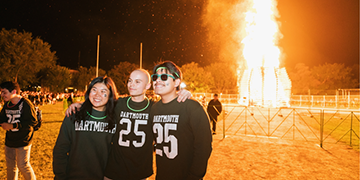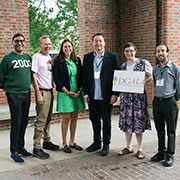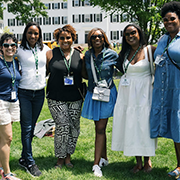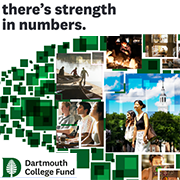50 for 50 Podcast: Carmen Lopez ’97
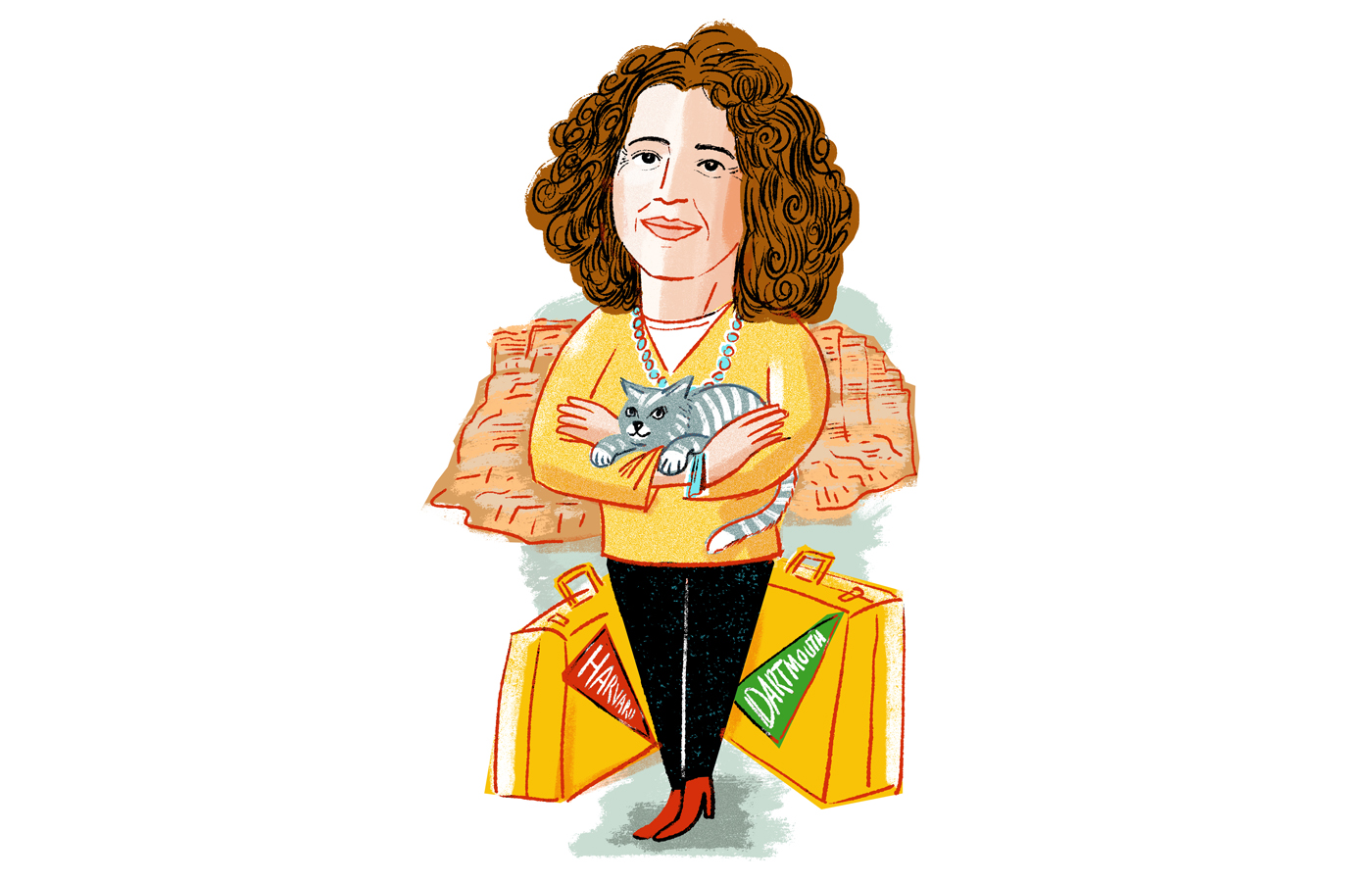
Jun 16, 2022
20 minute read
20 minute read
Carmen Lopez ’97
Growing up in the Navajo Nation, Carmen Lopez had never heard of the Ivy League when she became spellbound by a guest speaker at her high school: Dr. Lori Arviso Alvord, Dartmouth Class of 1979, the first female Navajo surgeon.
Arriving on campus in 1997, Lopez quickly involved herself in Native American Studies and joined the growing effort by Indigenous students to battle stereotypical language and imagery. After graduating, she earned a master's degree, becoming a teacher. Later, she became director of Harvard's Native American Program. Back home in the Southwest, she now directs New Mexico-based College Horizons, which supports the college and graduate school goals of Native American students.
Transcript
Jennifer Avellino: Hi everyone and welcome to our 50 for 50 podcast, 50 stories for 50 years as we celebrate three major milestones in Dartmouth's history. As many of you know, and some of you can remember first hand, 1972 was a pivotal year. Women joined the undergraduate community as Dartmouth students following several years of women exchange students on campus. The Black Alumni of Dartmouth Association or BADA is also entering its 50th year and so is the Native American program. Quite the trifecta of anniversaries, and also not a coincidence that so much happened during this critical time. I'm Jennifer Avellino class of 1989, past president of the Dartmouth Alumni Council and a former senior producer at CNN. As a journalist, my early days were spent as the news director for WDCR, WFRD, Dartmouth Broadcasting. I've had the good fortune to meet and bring to the airwaves remarkable people over the years. And this podcast in many ways brings me home. Over the next few months, I'll be talking to inspiring, influential, and fascinating Dartmouth alumni. They'll reflect on what it was like to be a woman, a Native American, a person of color at Dartmouth and how their time at the college led to the lives they're pursuing today. Our guest today is Carmen Lopez, class of 1997, a member of the Navajo Nation who grew up in Farmington, New Mexico. Her family also hails from the Forest Lake area of Black Mesa, Arizona. She has a history degree from Dartmouth modified with Native American studies and a master's of education from the Harvard Graduate School of Education. She became a teacher in both New Mexico and Massachusetts and later the director of the Native American Program at Harvard. After almost 20 years on the East Coast, she returned home in 2009 to take the helm of the New Mexico-based College Horizons, a nonprofit organization that supports the college and graduate school goals of Native American students through workshops and other efforts to increase college access. Carmen, welcome.
Carmen Lopez: Thank you, it's great to be with you and to celebrate this 50 for 50.
Jennifer Avellino: Absolutely, great to have you with us. You've devoted your career to helping Native high school students gain access to colleges and universities. Let's start with your path to Dartmouth. Tell me about where you grew up, who inspired you, and did you always think you would go far away to college?
Carmen Lopez: Yes. I grew up on the Navajo Nation between Arizona, Northern Arizona, and Northern New Mexico. And I kind of hopped around in my high school years, and it was because we had a great women's basketball team in the Navajo Nation. But I ended up settling at the tribal school, the Navajo Preparatory School, which was founded just before I became a student there. It had previously been a missionary school for Navajo students, but the tribe took control of it to create a new type of school around college preparation and to really focus on a new way of teaching Navajo children beyond that Christianizing type of mission-focused schooling. And it was there at Navajo Prep that we had Dr. Lori Arviso Alvord come as a guest speaker. So I was in my junior year as a high schooler when she came to speak. And I just remembered her because she was our first female Navajo surgeon, and so I was inspired by her. She talked about this place called Dartmouth College and Dartmouth Medical School. She also talked about just the hardships of going so far away from home, some professors telling her that she would not become a doctor, that it was going to be too hard for her. And her message to us was to always believe in yourself, to work hard even when you struggle, that you can do this. That message really resonated with me. And I just thought, I want to be like her, I want to go to this college called Dartmouth. I don't know where it was, and I want to become a doctor like her. So that was really my first introduction to Dartmouth College was from this alum coming back to speak at a high school.
Jennifer Avellino: She's a member of the class of 1979, one of the early classes of women. So perhaps a bit of double inspiration there, although perhaps you didn't know that at the time.
Carmen Lopez: No, no. And really it was seeing the campus, the small campus, the beautiful setting, the woods. And of course seeing a thriving group of Native students there that I really said, "I can imagine myself here, this would be a good fit for me."
Jennifer Avellino: So Carmen, tell me about your time at Dartmouth. I understand you played on the first varsity women's volleyball team among many other things.
Carmen Lopez: Yes, I was involved as a student athlete and tried out for the club team first, so the women's club team, volleyball team was my first entry into playing on a sports team there. And Dartmouth was under review for Title IX. So by my sophomore year, the women's volleyball team along with the women's softball team came into existence. So we went from a group of us women buying bagels and renting out the van from I think Tuck and driving ourselves, scrimping, saving, fundraising ourselves for uniforms, gas money to then over sophomore summer Ann Marie Larese was hired as our new head coach, and that began our program. It was pretty amazing to be on that transition time to see, again, what resources really go into supporting a varsity athletic team.
Jennifer Avellino: Can you tell me a little bit about your involvement with the Native American Program and the Native American Studies Department during your undergraduate years? And it also sounded to me when we spoke earlier about how your perspective as a Native student shifted a bit when you came to Dartmouth.
Carmen Lopez: Yes. So when I first applied to Dartmouth, I was quite ignorant. I really didn't understand what the Ivy Leagues meant, I didn't have these preconceived notions, which probably helped me when I applied to college because I wasn't intimidated by the Dartmouth. So it really wasn't until I got to campus that I was understanding this institution, the history. I think we got a book on the history of Dartmouth, which I read. And then I think it's that initial shock at the time there was so much still around the Dartmouth mascot, which was never an officially sanctioned mascot, this Indian head. And seeing other students running around with this t-shirt. You're first confronted by, again, the stereotypes and notions of other people of what it means to be indigenous and then alums trying to tie that to the founding of Dartmouth of course, which is to educate English and Indian youth but taking this racist way of looking at honoring indigenous people. So that's why I was so grateful to upper class students who—you have a couple of years ahead of you where they're dealing with this already, confronting it. And I loved learning and becoming politically aware. So one of my most vivid memories in my first year, I remembered being at a meeting and some of the upper class getting ready for Columbus Day. They were like, "Everybody needs to show up on The Green, wear black and we are going to have this candlelight vigil." I hadn't been raised in New Mexico, in my family with Columbus Day being a big deal for us. We really didn't bother with it. It was a holiday, we didn't really celebrate it nor did we discuss it. That's part of this ignorance that I came in with. So I just thought, what's the big deal about this Columbus Day thing? So we get to the Green that night and then we're hearing from the upper class about the historical impact of colonization and genocide, and how do you understand that from 500 years ago to Dartmouth's founding to today? And the relationships between settlers and indigenous people. So that was just new, brand new for me as a first year student to begin to make these connections and to become aware. I'll share one other experience of my time at Dartmouth early on as a Native student. There was an alumnus who wanted to donate a million dollars to the Native American Program if the Native American Program and the students would endorse that Indian mascot. I was on this committee, this small group of students who got to write the letter back to this alumnus with our answer, which was going to be a no. No, thanks, we'll never take a bribe, and here are the reasons why offering this money is wrong with such conditions. So I think Dartmouth offered a lot of those opportunities to grow into leadership, to know that we're not fully formed when we come in. And that's part of what the college experience is, is to learn different opinions, to disagree with others and to also come together as a community around matters that are social justice related where we really know we have to stand up not just for ourselves but for those younger brothers and sisters and cousins, and now for me, children that are going to come along that they shouldn't have to deal with some of these same things.
Jennifer Avellino: So your time at Dartmouth was an education for you in so many ways, not just your own learning but your growing as you've said into a leadership role where you were able to teach others. When did you know that teaching and a career in education was going to be your course, and how did you pursue that after Dartmouth?
Carmen Lopez: Yes. Like many students, I came in pre-med and was beginning to take all of the required courses along with exploring other majors and classes. But it really was Candace Jimerson who sat me down, and she was a history major. She might have also been an African studies major or double major as well. But she's the one who really influenced me initially and said, "Carmen, let's talk about history, and let's talk about education. And here are these amazing professors that you should take a class with." I think at the same time with the Native studies program being strong and taking some first introduction to Native American studies classes, again, I didn't have that in my high school career. I had Navajo studies, Navajo language. So to take my first Native studies class, it wasn't until college. So those naturally became interesting to me. And again, same type of thing as an Indigenous student, I'm coming from the Southwest. I don't know anything about Native Hawaiians or Alaska Natives or Natives from other tribal nations. So I'm learning about this just as my peers are. So it really was when I took my first education classes with Professors Andrew Garrett and Robert Binswanger. And I just remembered in both of those classes just gobbling up the material. My mind exploded, I could do all of the readings effortlessly, I wanted to talk with my classmates. So there was a huge difference between my engagement and what I felt like in that class compared to some of my other pre-med classes. So that was this natural feeling. So of course I was like, "I'm hungry for that intellectually, let me take another class, let me take another class." That really was the shaping of who I became as an educator. And even today, I come back to history all the time and I'm thinking through always, how did we get to where we are today and how do we chart the course for that? Indigenous futurisms that I love to think about as well.
Jennifer Avellino: Well, I'm a history major as well, so I think about those issues a lot. And as we look back on this really pivotal time in Dartmouth history, 1972, and these three milestone anniversaries, I do spend a lot of time thinking about what's ahead in Dartmouth's future and where we've come from. So you spent some time teaching both in Massachusetts and home in New Mexico, you ended up leading the Native American Program at Harvard. So tell us about your big move to take the helm at College Horizons in 2009. What motivated you to take that step?
Carmen Lopez: Coming to College Horizons was a big career change for me. But it coincided with, again, having been out East for about 20 years. I was longing for home, I had my first child. I wanted to raise my daughter closer to my parents, her grandparents, my relatives, and the Navajo Nation, to our homelands. So that whole to come back home as a mother and a parent was significant. Many of the places that I've had professional experience are institutions of privilege. And so I was at a point also in my career where I had just finished with directing at the Harvard Native American Program. And I have all of this knowledge, these networks, these connections, these resources, and I wanted to begin to apply that back in community. I often say Harvard got the best of me for five years where I delivered excellence to that institution, to the students, and in our work there. What would it look like if I give my excellence directly to Native students, parents, community members? And they deserve that, that's what I'd been working for. And I was making a conscious choice to say, okay, time to return home, time to contribute, time to give back directly. And College Horizons became that great middle place between accessing higher education and then working directly with students, both high school and undergrads. And I think at the core of who I am, I'm a teacher. So I love that student engagement and student interaction. That's really what drove me back was focusing on that relationships with communities.
Jennifer Avellino: So tell us more specifically about the programs that College Horizons provides for students and about your partnerships with colleges and universities?
Carmen Lopez: Yes. So College Horizons, our essential mission is to enroll and graduate more indigenous students into higher education. And so we've developed three programs: College Horizons, the scholars program and graduate horizons as pathways to help a student from high school go all the way up to a PhD or to professional schools. So we partner with about over 70 colleges and universities throughout the nation, including Dartmouth as a partner. And we bring 200 to 300 Indigenous students to one of my partner college campuses in the summer, and we work with them for an entire week on the college application process. And financial aid is a huge part of that too. College has become so unaffordable for many families across the nation. But when you're working with indigenous students with high rates of poverty, options for considering a place like a Dartmouth is so far out of reach. And so our job is to come in and say, "College is affordable, and here's how you access the resources to these institutions."
Jennifer Avellino: This can be a really life-changing experience for them. And it's not just about learning how to write a college essay or fill out an application. Speak to more of the challenges that some of these students have.
Carmen Lopez: At College Horizons, we're working with students across the nation. So Indigenous Hawaiians, Alaska Natives, and then of course on the lower 48, we have students that come from over 570 different tribal nations. It's really amazing to bring all of these students together. It is a type of gathering of nations just in College Horizons. And it's a mix of the technical parts of the parts of the application and moving them through it. But we add on the layer of why college and talking about identity, talking about colonization and decolonization. Talking about culture and language as an asset and bringing your ancestors with you to college. Especially during this pandemic of course, that heightened and raised the visibility around the two Americas that we have, the have and the have nots. And for Indigenous students in the pandemic, it was all about lack of broadband access. There was literally 50% of indigenous students who could not go remote during the pandemic. And this is physical infrastructure, internet, cable lines that could not come into communities where homes couldn't even, they weren't even wired. So this isn't about parents being able to afford internet access and having it in their home, it's literally there are no lines coming into those communities.
Jennifer Avellino: I'd like to ask you about Dartmouth's Presidential Commission on Financial Aid. What does it mean to so many Native students and to any lower income students to have their financial needs met in a fuller way when they go away to college?
Carmen Lopez: The Presidential Commission on Financial Aid came about in the crisis of the pandemic of families' financial circumstances utterly being changed. And that can be from high income families to low income families. But we also knew that the pandemic was going to have longer term repercussions to financial aid and economic recovery. So how do we start to look at the sustainability for students going forward? On top of it, we are in this building time of racial and social justice reckoning. And what is the role and where does Dartmouth sit and reflect and think about where they are in terms of all aspects of educational equity? When I was approached about joining this commission, it was all of those parts coming together for me. What does educational equity in higher ed look like? Is Dartmouth affordable to students, both low income students and the middle class? So much of the middle class is being impacted by higher education. Parents, they're gainfully employed, they're just not able to afford an $80,000 a year college for all of their students. For Native American students, 50% are taking out loans for college. It's really important that Dartmouth becomes a place where it is affordable for all students to be able to participate in an incredible educational opportunity.
Jennifer Avellino: You think about so much more clearly than just academic fit for students when they choose a college. But part of your job is also educating universities about the students who are applying, it's not just about students needing to fit in. Can you talk a little bit more about your conversations with colleges and universities?
Carmen Lopez: My answer's going to tie back to what this is about, the 50 for 50 and this anniversary. When we're thinking about the historical nature of women and people of color coming into higher education 50 years ago and the affirmative action cases associated with it, what I tell my college partners, and it's also an important message to our students is to understand that those affirmative action cases laid out that institutions are deficient by not having women, by not having Native Americans, African Americans, Hispanic, LGBT, all of our underrepresented communities. I have to sit that always in the forefront first to say that colleges need my students, they need us there to help that institution be better, to help the students, the peers, the classmates be better, to help the professors be better. That's my first place is to say, hey colleges, let's have some cultural humility here. Jennifer Avellino: So Carmen, you spend your professional life thinking about the future for your students, what do you hope for Dartmouth's future when it comes to Native American studies and the role of Native American students on campus? What changes do you see ahead?
Carmen Lopez: As a history major, as someone who's always looked to understand the past and how it shapes our future, I really am inspired by futurisms, whether it's Afro futurisms, Hawaiian futurisms, Indigenous futurisms. I love this space of saying I see myself, I see my students, I see my grandchildren in this space. I see them at Dartmouth, and I'm imagining how amazing it's going to be for them to be in that place. When I think now of this 50 years that has passed and the repatriation of Samson Occom's papers and the reaffirmation by President Hamlin to Dartmouth's founding purpose. What that represents again is enduring relationships that Dartmouth has to indigenous peoples.
Jennifer Avellino: And Carmen, a final question for you, which speaks to what you've called this enduring relationship between Dartmouth and Native Americans. During Dartmouth's first 200 years, maybe a few dozen Native American students graduated from the college. Since President Kemeny and the college recommitted itself to educating Native American students in the 1970s, that number is close to 1,000. History and Native American studies Professor Colin Calloway wrote in the Dartmouth alumni magazine a few years back that the people, the Native Americans that college founder Eleazar Wheelock intended to change at Dartmouth have helped to change Dartmouth. Can you reflect on that for us?
Carmen Lopez: I love that quote because that's at the heart of relationality and transformation. One motto at College Horizons that I use with the students is college pride, Native pride. And what I'm bringing together there is this idea of Indigenous knowledge systems and Western knowledge systems, that they can sit next to each other, that a student has access to both of them. That I hope that when they come to college that they bring these two ways of being and knowing together. And they don't have to choose one or the other, they can be both and access both power systems. And to me, again, that quote just represents what diversity is supposed to be on a college campus. It is about all of the different worldviews, perspectives, nations coming together to think in a new way together to make new knowledge. And then to go to their communities and affect the change that they can from that experience. And I really do believe that Native students that come to Dartmouth forever change that institution, whether it's in the classroom with their peers or by returning to colleges as scholars or engaging from that tribal perspective with the institution. I hope that that continues to be.
Jennifer Avellino: Well, Carmen, this has been so fascinating and so inspiring to hear about your work and about the opportunities that you've helped foster and provide for Native students both at Dartmouth and at so many colleges and universities around the country. So thank you so much for joining us.
Carmen Lopez: Thank you, it was great to be with you.
Jennifer Avellino: And thanks to all of you listening to our 50 for 50 podcast series supported by our office of alumni relations. I'm Jennifer Avellino. My thanks to our co-producers Catherine Dara and Charlotte Albright, and to Dartmouth's media production group for technical assistance. We hope you'll join us for our next episode marking Dartmouth's three-milestone anniversaries.


